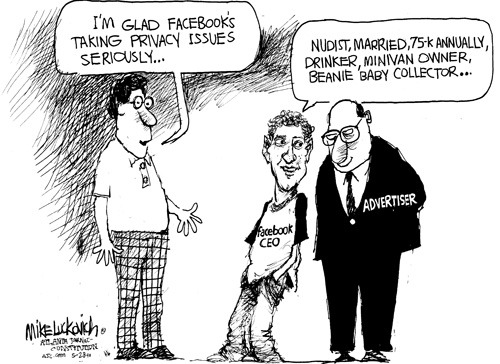Don't wanna be here? Send us removal request.
Link
The Tension Between Privacy and Security
1 note
·
View note
Photo

Too Much Information
https://www.truthdig.com/cartoons/too-much-information/
1 note
·
View note
Text
Why It Is Hard to Control Cybercrime?
This week we had a topic about cybercrime. Since the Internet has now played a more and more essential role in almost every part of social life, having a safe cyberspace is prime for the public. Past several years have witnessed the intensive increase of cybercrime and governments have also tried many ways to control this kind of prevalence, however, it seems not an easy task. So, what makes it become harder to deal with crime in cyberspace than in real world? Parts of the reasons may be as follow:
First, cybercrime is much easier. Different from crimes in real life, the cost of cybercrime is comparably low. Everything can be done by simply inputting commands on the keyboard without the need for a certain place or time. In addition, some behaviors that comprise cybercrime are not illegal themselves, which results in a credible refuge for crimes. For example, Anonymous achieve their goals by gathering thousands of people “attacking” a website at the same time, resulting in its crash. [1]However, usually, visiting a website is a behavior invited rather than inhibited.
Second, cybercrime is more tempting. The profits from cybercrime are very attractive. The value of all kinds of data and information in the cyberspace generally far exceeds the value of the computer network system itself. With the tendency that banks, insurance companies, and other industries rely more on electronic systems, opportunities for cybercrime have increased accordingly.
Third, the lack of laws and regulations of cybercrime. In the UK, we know have Computer Misuse Act, which has been amended recently. Although it has been changed in an attempt to meet new challenges of cyberspace, it still has material and procedural problems. [2]The situation is pretty similar in other countries. For instance, in China, there is no specific law for cybercrime till now with all cybercrimes resolved under general law.
Forth, the territoriality of law and lag in international cooperation. The Internet has eliminated social boundaries and national boundaries. Since laws and regulations are territorial, the issue of jurisdiction has also been put in front of people. At present, there are still many problems in understanding and cooperating in the area of cybercrime at the international level. Since many cybercrimes are transnational, the lack of extradition and mutual assistance treaties finally leads to the connivance of crime. Moreover, the weak enforcement mechanisms in existent international cooperation also make it less effective.
[1] Mansfield-Devine S, 'Anonymous: Serious Threat or Mere Annoyance?' (2011) Network Security
[2] MacEwan, N. "The Computer Misuse Act 1990: lessons from its past and predictions for its future" Crim. L.R. 2008, 12, 955-967
1 note
·
View note
Link
It is said that ” the whole point of hashing it is to reduce the amount of human interference/involvement is needed in these cases. This solution is both faster (proactive vs reactive) and also would VASTLY decrease the amount of Facebook moderators that would see such things. “ It seems that Facebook wants to do something to control content without being involved in infringement. So, does it mean, if those illegal photos are published on Facebook, that Facebook has no knowledge of it and can avoid content liability?
0 notes
Text
Evaluating Ways to Solve Illegal Filesharing
Filesharing has become quite an essential issue with the development of the Internet. Movies, music, literatures and other items under the protection of IP rights can be shared to anyone at every corner of the world by perfect copies. Since copyright seems to be largely threatened by information technology, a great many approaches are used against the tendency. Let us focus on three of them—-graduated response system, blocking and blanket license for filesharing—-and, in particular, thinking about their advantages and weaknesses.
Blocking is a truly straight forward way to solve the problem. “In cases where the primary infringer(s) cannot be identified or pursued, the blocking of infringing material by these ISPs may be the only practical way of stemming the availability of such material. ”[1] However, despite its effectiveness, the drawback is also obvious: blocking always means stemming everything instead of just filtering materials protected, which can be regarded as infringement of the right of information freedom.
Graduated response system is a “notice and notice” framework[2]. When ISPs receive infringement reports from right holders, they send emails to alleged subscribers to notice about their illegal activities. It is much milder than blocking, nevertheless, this approach might be ineffective. As notices contain no penalties, subscribers can just ignore them and continually repeat the behaviors of illegal filesharing. Besides, monitoring online activities, figuring out infringements and sending notices are costly comparing to what can be achieved. And concerning the disclosure of their information, the protection of users’ privacy should also be taken into consideration.
Blanket license is also called non-commercial use levy system. This scheme would aim to permit and to compensate all non-commercial copying, exchange and modification of protected works occurring on the Internet,[3] by ways like levying on the equipment or service people use to connect the Internet. This approach, on the one hand, ensures creators’ interests without the external cost caused by identifying and informing every individual infringer; on the other hand, meets the need of public for information in the Internet society. What makes it a problem is that it shows a kind of indiscrimination, namely it levies equally on all users of certain service or equipment regardless of considering whether or not they copy or disseminate copyrighted works. Thus, market uncertainty may be created. Apart from this, issues like how to set the amount of compensation and what is the principle of redistribution of compensation among right holders are also hard to resolve.
All in all, it is hard to say which approach is the best and there is no solution that suits all situations. I think it is more like a case to case question and the final purpose is to achieve the balance among interests.
[1] L Nunn, Internet service providers: copyright infringement, Westlaw, Insight, 5 May 2015.
[2] Giblin, Rebecca. “Evaluating Graduated Response.” Columbia Journal of Law & the Arts 37.2 (2014): 147-210.
[3] Mazziotti, Giuseppe, and SpringerLink. EU Digital Copyright Law and the End-User. Berlin, Springer, 2008. 253.
0 notes
Link
The creator has done a lot to stop boom of this internet meme, after the fight with alt-right, he continuously sues the meme maker. So, is internet meme an infringement of copyright or a kind of fair use?
0 notes
Text
Market and Cyberspace Regulation
In his article Code: And Other Laws of Cyberspace, Lessig L told us law, moral, code and market are the four constraints that shape the world of cyberspace regulations. Rather than independence, their relationship shows more about interaction. The support or opposition between different constraints can achieve various effects for regulating cyberspace.
It is not difficult to identify interplays among law, code and norms. For example, to reduce dissemination of pornography on the Internet, governments promulgate laws to punish the publisher; education make the negative evaluation of spreading pornography become a norm; and they both force technologists to build code that meet their requirements, which in turn justify laws and norms. However, since the aim of market is financial benefits, what market entities are willing to do must be those profitable. There is no doubt that market can earn money from the prevalence of pornography, but how can it earn from the limitation? It seems that the only thing market can do is to obey the requirements of other constraints. So, dose market really has reactions on them? I believe the answer is yes.
First, the impact of the market on the law. Take tobacco as an example, we know smoking is harmful to health and many authorities do have some anti-smoking regulations. However, instead of being totally banned, to some extent, tobacco can still legally circulate in the market. That is the influence of market—consumers like it. Even the government cannot refuse the great benefits of tobacco sales.
Second, norms and market. Custom in trade practices are always ideal candidates of norms. Furthermore, some trade rules have become indispensable parts of social life, which means the reconstruction of norms can cannot destroy the system of the market. We can ban the dissemination of pornography, on line, but that doesn’t mean you do not need to pay for what you get—maybe pornography—on line, even the information itself is illegal.
Third, the code. Owning to the popularity of Internet, new ways of transaction largely promote the development of new technologies. New code is constantly written to meet the needs of online transactions like PalPay and Apple Pay. When authorities try to limit something through code, they need to take the effects to other related questions into consideration, like whether there will be a new payment method created by code because of the stimulation of commercial need or if the code itself is reliable. And all of these reflect the role of the market in cyberspace regulation.
0 notes
Photo

Smaller the size is, bigger the world is. https://goo.gl/images/BP6Zrt

Computer programmers with various boards, from left to right: Patsy Simmers, holding ENIAC board (became operational 1947), Gail Taylor, holding EDVAC board (became operational 1951), Milly Beck, holding ORDVAC board (became operational 1951), Norma Stec, holding BRLESC-I board (became operational 1962).
466 notes
·
View notes